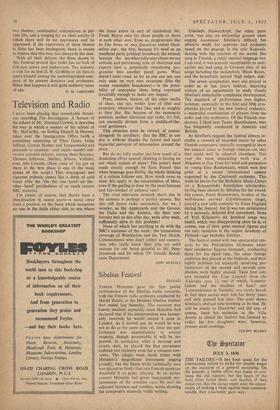Television and Radio
I HAVE been playing that remarkable Ameri- can recording The Investigator. A feature of the school of Mr. Norman Corwin, it describes the way in which a senator of the school of Mr. McCarthy, on finding himself in Heaven, takes over the Immigration Office (with a committee consisting of Titus Oates, Judge Jeffreys, Cotton Mather and Torquemada) and proceeds to examine—and expel—sundry sub- versive celestial citizens. among them Socrates, Thomas Jefferson, Shelley, Milton. Voltaire, even Abe Lincoln. (How some of 'ern got up there in the first place is one of the weak points of the script.) This courageous and vigorous polemic comes like a drink of cold water after the 'On - the - one - hand - on-the - other-hand' parchedness of so much current BBC material. I'm aware, of course, that there's been a liberalisation in recent years—a move away from a position on the fence which recognises no one in the fields either side, to one where the fence exists (a sort of symbolical Mr. Frank Byers) only for those people to shout at each other over. Even so, programmes like In The News or Any Questions cancel them- selves out: the first, because it's used as an unofficial party political broadcast; the second, because the see-what-jolly-nice-chaps-we-are attitude and patronising tone of chairman and experts turn a potentially stimulating pro- gramme into another panel game. What doesn't exist—and, as far as one can see, can only exist on very rare occasions (like the recent rationalist broadcasts) — is the possi- bility of unpopular ideas being expressed forcefully enough to make any impact. Press, cinema, theatre, all the other media of ideas, can say, within laws of libel and propriety, whatever they like, and as toughly as they like. But because of the monopoly position, neither television nqr radio, it's felt, can correctly deviate from a middle-of-the- road gentleness. This situation must be viewed, of course, alongside its corollary: that the BBC in our day is without dispute the fairest and most impartial purveyor of information around the place. But do we fully realise just how much of a deadening effect neutral thinking is having on our whole system of ideas? The point's been made clearly enough by Ezra Pound that when language goes flabby, the whole thinking of a culture follows suit. How much more so must this apply to the emasculation of ideas, even if the gelding is done by the most humane and fair-minded of cultural vets?
The rival television network that's due in the autumn is perhaps a partial answer. But this still leaves radio untouched. Are we, I wonder, as the Appleyards and the Groves, the Dales and the Archers, din their con- formity into us day after day, week after week, sufficiently alive to this problem?
None of which has anything to do with the BBC's successes of the week: the immaculate coverage of Wimbledon and the Test Match. Commentators who don't jabber and camera- men who really know their jobs are solid reasons for our being grateful to Mr. Peter Dimmock and his whole TV Outside Broad- casts Department.
JOHN METCALF














































 Previous page
Previous page